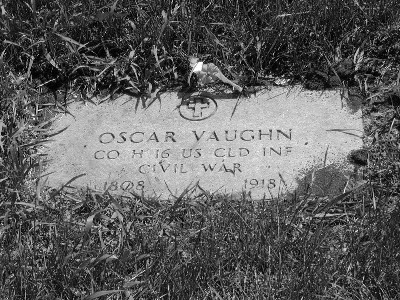 |
Minneapolis Pioneers and Soldiers Memorial Cemetery History Page Alley Article |
| Home | Burial Search | Friends | History | Photo Gallery | Visitor Information |
| Alley Articles |
|
This article originally appeared in the Phillips community's Alley Newspaper, December 2003. African-American Civil War Veteran Seven of the 164 known Civil War veterans buried in Minneapolis Pioneers and Soldiers Memorial Cemetery are African-Americans. The best documented of these veterans is Oscar Vaughn. During the Civil War, Mr. Vaughn served as a private in Company H of the 16th U.S. Colored Infantry. The unit was organized in Nashville, Tennessee in Dec. 4, 1863, and was involved in the Battle of Nashville in December 1864. After he was mustered out in April 30, 1886, Mr. Vaughn returned to his native state of Kentucky, In the years following the Civil War, real estate brokers and developers made special outreach efforts to encourage African-American veterans to re-settle in Minnesota. In April 1898, Mr. Vaughn was one of 85 African-Americans who relocated from Kentucky to Fergus Falls, Minnesota, where they established a small farming community. It is highly likely that one or more members of their group were recruited at the Grand Army of the Republic’s 1896 encampment which was held at the Minnesota State Fairgrounds. On April 14, 1898, the Fergus Falls Daily Journal reported that Mr. Vaughn “purchased an acre of ground and a good house for $150 cash from W. P. Bayley.” Mr. Vaughn remained in Fergus Falls until his health began to fail. Three years before he died, he moved to Minneapolis to live with his daughter. Although cemetery records indicate that Mr. Vaughn was born in 1808 and that date is the one that appears on his grave marker, census records indicate that he was born in 1832. Over the years, it has been reported that Mr. Vaughn was 110 when he died but it is more likely that he was 86. In either case, given that the average life expectancy for men in 1900 was less than 50 years, Mr. Vaughn lived an extraordinarily long and active life. He died on June 25, 1918 from “senility.” In 1986, a veterans’ group arranged for Mr. Vaughn to receive a new military marker.
Next Article -> James Glover -- January 2004 |
|
©Friends of the Cemetery, 2005-2008 Contact us at history@friendsofthecemetery.org |
File last updated: Wednesday January 16, 2008 |
